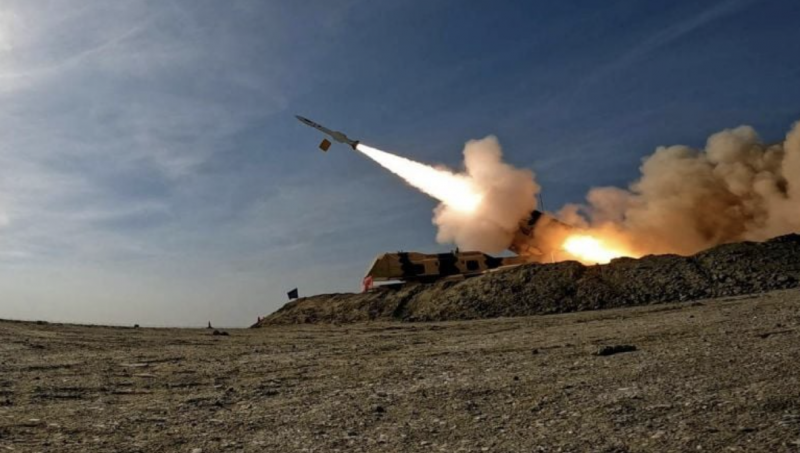
A missile launched during a military exercise at an undisclosed location in southern Iran, Jan. 19, 2024. (Credit: AFP)
Jordan’s air force intercepted and downed Iranian drones heading toward Israel on Saturday evening. On the other hand, Saudi Arabia and the United Arab Emirates (UAE) played a pivotal role in neutralizing this attack.
Under pressure from the US, Riyadh and Abu Dhabi secretly agreed to share radar data and intelligence concerning Iran's attack plans, as reported by the Wall Street Journal (WSJ).
Tehran notified the two Gulf states of its intentions two days before the strikes, allowing them to safeguard their airspace. This intelligence was subsequently relayed to the US, affording Washington and Israel a crucial advanced warning, as reported by the publication.
The Saudi and Iraqi governments have authorized US Air Force tanker aircraft to remain airborne in their airspace to support American and allied patrols during the operation, according to Al-Monitor.
These limited details emerged regarding the unprecedented security cooperation between Tel Aviv, Washington, Riyadh and Abu Dhabi, as Iran directly targeted Israel for the first time.
For over a decade, successive US administrations have been pressuring Arab countries to share their air defense intelligence, as reported by Al-Monitor.
Despite this, a regional defense plan in collaboration with European states focused on intercepting drones and missiles served as the foundation for neutralizing the Iranian response. This plan relied on a network of sensors positioned in various countries, with Tel Aviv contributing its detection and interception capabilities. Arab partners have provided radars near the Iranian border, according to Haaretz.
Haaretz further noted that several indications of the operation of this system, known as the Middle East Air Defense Alliance (MEAD), have been observed since the onset of the war in Gaza.
Fear of reprisals
Tel Aviv welcomed the coordination with Arab countries, viewing it as a means to isolate Iran, especially because Israel found itself regionally isolated due to the Gaza war. "The world is against Iran," said Benny Gantz, a member of Israel's war cabinet.
"This is a strategic achievement that we must leverage for Israel's security," he added. "We will build a regional coalition to confront the Iranian threat and will exact a price from Iran in the time and manner that is right for us."
In reality, this marks the initial trial of the security framework between Israel and Sunni states, as desired by Washington. This initiative follows the 2020 Abraham Accords and Israel's integration into the US Central Command (Centcom) for the Middle East in 2021 — a notable shift from its previous affiliation under the European Command.
The Gulf states have consistently approached the idea of increased collaboration with the Israeli-American alliance with caution due to concerns about potential Iranian reprisals.
Saudi Arabia and the UAE in particular are facing a significant challenge: Maintaining their security partnerships with the US — and indirectly with Israel — without provoking Iran, especially considering they would be on the frontline in the event of direct confrontation.
The prospect of a regional conflict, as illustrated on Saturday evening, presents a nightmare scenario for Riyadh and Abu Dhabi. Both nations have prioritized stability and economic prosperity, with Saudi Crown Prince Mohammad bin Salman and his Vision 2030 diversification plan emblematic of this focus.
Keen to preserve a semblance of equilibrium, Saudi Arabia persists in cultivating diplomatic relations with Iran, which were reinstated in March 2023.
Unlike most Western nations, Saudi Arabia denounced the Israeli strikes against the Iranian consular annex in Damascus on April 1.
Furthermore, Saudi Foreign Minister Faisal bin Farhan Al Saud received a telephone call from his Iranian counterpart Hossein Amir-Abdollahian on Sunday evening, during which they discussed developments in the region, as reported by the Saudi Press Agency (SPA).
"Politically, the Gulf States have safeguarded their positions by condemning Israel's egregious actions and violations of international law during the conflict, while simultaneously indicating their ongoing willingness to pursue normalization efforts with Israel,” said Hassan al-Hassan, a researcher at the International Institute for Strategic Studies (IISS). “This strategy allows them to convey varied messages to different partners.”
Additionally, Riyadh said that an American defense pact is among its prerequisites for normalizing relations with Tel Aviv.
Unconditional protection
“Especially since Saturday night's attack, Riyadh and Abu Dhabi are dreaming of a security umbrella like the one granted to Israel,” said Fatiha Dazi-Heni, a researcher and lecturer at Irsem Paris and Sciences Po Lille. “Their stance is indeed precarious.”
While it can be argued that, in a sense, they are siding with one party over the other, this choice stems from their imperative to maintain ties with their significant geographical neighbor at any cost, according to Dazi-Heni.
“Yet, as suspicion toward Iran persists, the underlying calculation suggests that the unwavering protection afforded to Israel by the US might also work in their favor, given that they lack access to such support themselves,” she added.
While the collapse of the normalization process between Tel Aviv and Riyadh was perceived as one of the objectives of the Oct. 7 attacks, Tehran appears to be amenable to a reconciliation between its neighbors and Israel, provided it does not entail aggression.
"If Saudi Arabia and the UAE participated in an Israeli offensive against Iran, the situation would have been markedly different, and Iran’s Islamic Revolutionary Guard Corps (IRGC) have explicitly cautioned about the repercussions if third parties were involved in such operations," said Ali Alfoneh, a researcher at the Arab Gulf States Institute in Washington (AGSIW).
Furthermore, it seems highly improbable that Saudi Arabia's or the UAE’s involvement would extend beyond a defensive posture. As of now, there has been no official response from the Iranian authorities regarding the stance of the Gulf States on the drone attack on Israel.
This article was originally published in L'Orient-Le Jour. Translated by Sahar Ghoussoub.